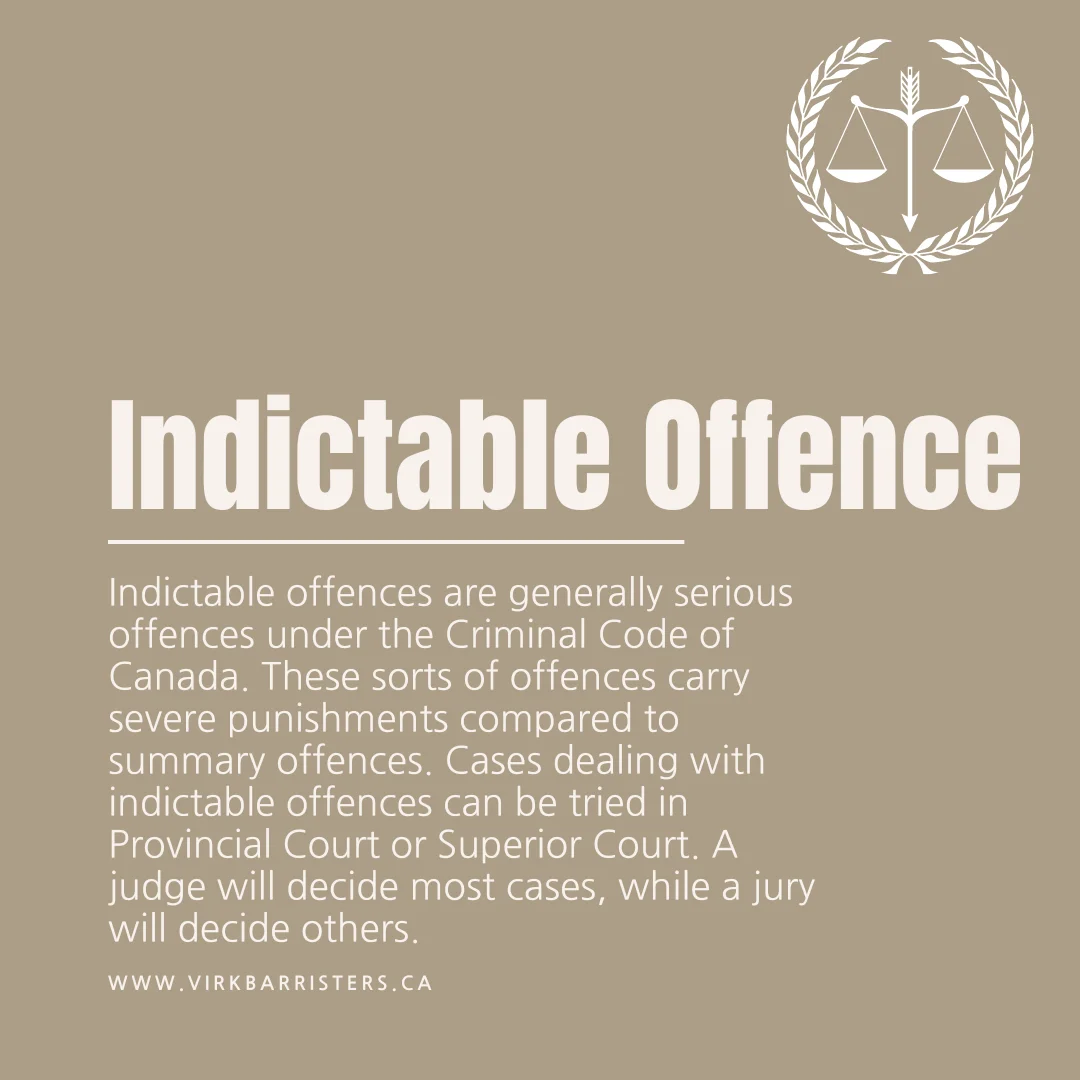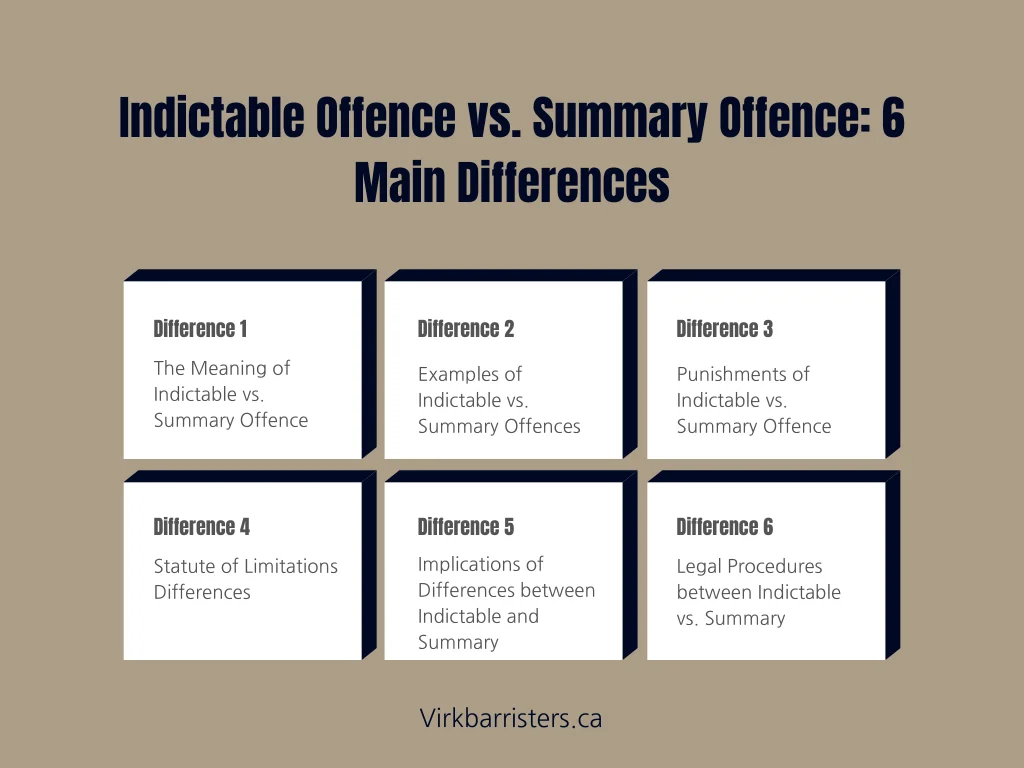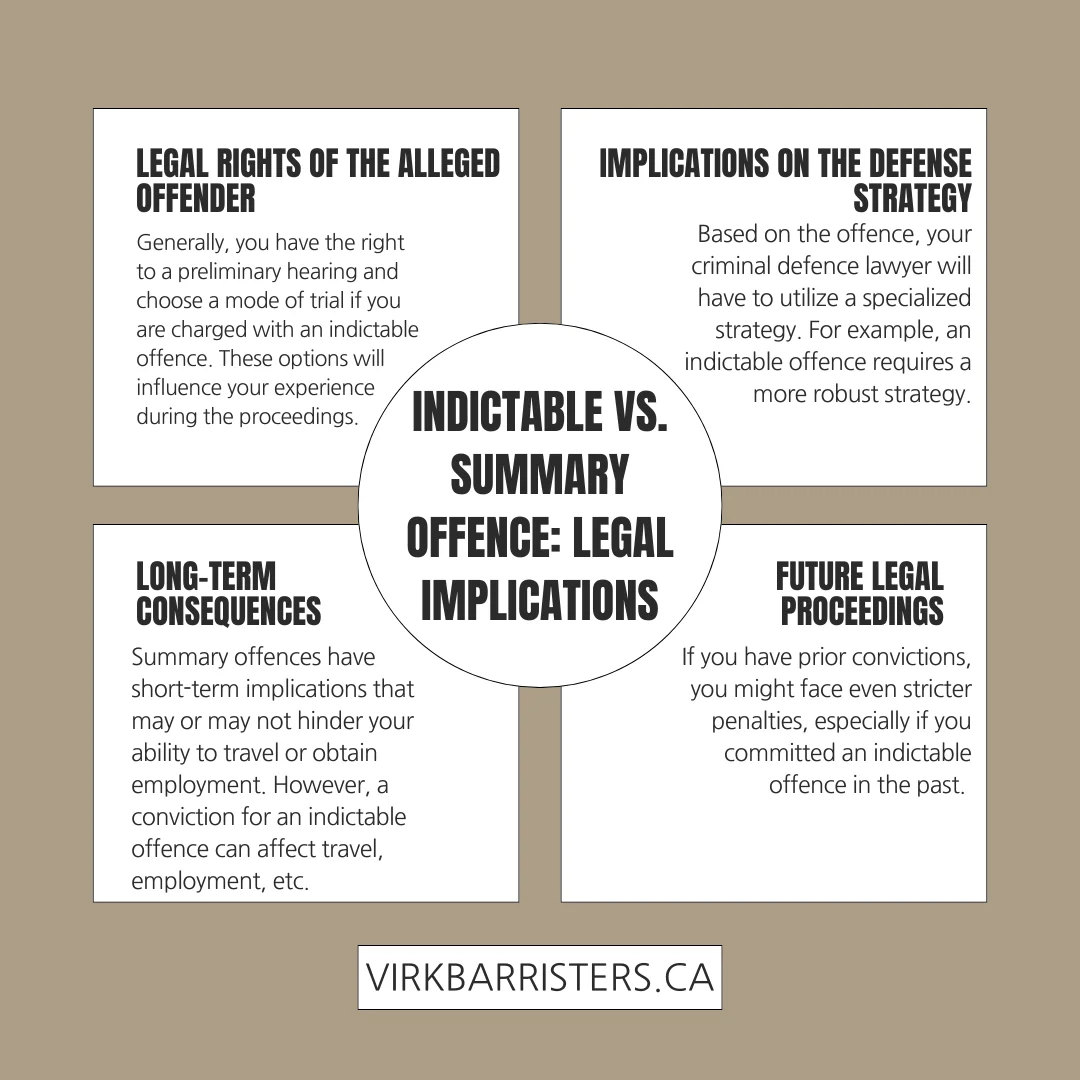

According to the Criminal Code of Canada , one can commit three types of offences. These include indictable offences, summary offences, and hybrid offences.
Whether the crime is indictable, summary, or hybrid depends on the severity of the case and the type of crime committed. If you want to gain a better understanding of the difference between indictable offences and summary offences in Canada, keep on reading.

Indictable offences are generally serious offences under the Criminal Code of Canada. These sorts of offences carry severe punishments compared to summary offences.
Cases dealing with indictable offences can be tried in Provincial Court or Superior Court. A judge will decide most cases, while a jury will decide others. The accused can choose their type of trial.
An important point to note is that indictable offences are not subject to a statute of limitation. Generally, charges for crimes aren’t pursued if there is a great deal of time between the alleged act and the charges. That is not the case with indictable offences. In Canada, you can be charged with an indictable offence any time after you have allegedly committed a crime.
These offences can lead to a complex trial process and also have serious consequences.
If you are charged with an indictable offence in Canada, we recommend that you contact a criminal lawyer in Mississauga to ensure that you receive the legal guidance and support you need to navigate the charges.

To understand indictable offences even better, let’s dive into various indictable offence examples to help you understand what type of offences can be indictable:
Murder is one of the most common serious indictable offences in Canada. You can learn more about its punishment, such as a life sentence, on our blog .
Murder is classified into first-degree murder, second-degree murder, and manslaughter. Each one has a unique burden of proof, trial process and punishment
Robbery is considered to be a straight indictable offence and is a serious crime with harsh penalties. The penalties will depend on how the robbery is committed.
For example, if a firearm is used to commit robbery, then penalties can range anywhere between five years and higher.
This is perhaps one of the most serious forms of assault, where one person intentionally causes bodily harm to another person that can disfigure them or lead to life-threatening injuries.
Kidnapping takes place when one person forcibly seizes and detains another person against their will. Typically, kidnapping also involves the use of force or threats.
Kidnapping can have a wide range of cases, from ransom demands to parental abduction.
Arson is when one person intentionally sets fire to another’s property with a malicious purpose. Arson can involve setting fire to properties, land, vehicles, buildings, and other types of property.
It will include lengthy prison sentences, severe fines, and other penalties, depending on the case.
An indictable offence punishment in Canada is serious and has severe consequences. For example, the maximum penalty one can get for such an offence is life imprisonment.
In addition, the offender may have to pay substantial monetary fines. An important point to note here is that if someone is convicted of an indictable offence and the prison sentence is less than two years, the offender will serve this sentence in a provincial institution.
If the punishment is more than two years, then the offender will serve the term in a federal prison. Here are some other things to know if you are charged with an indictable offence:
In conclusion, the punishment for indictable offences will greatly vary depending on the type and severity of the offence committed, and of course, it will depend on the specific facts of your case.

Now that you have some basic knowledge about indictable offences, you might wonder how they are different from summary offences.
Here is everything you need to know about indictable vs. summary offence in Canada to differentiate between the two:
We’ve already discussed the meaning of an indictable offence. Let’s switch gears to focus on the meaning of a summary offence. A summary offence (also known as a misdemeanour in the United States) is less severe than an indictable offence.
One of the defining features of these offences is that they are generally handled much quicker in the criminal justice system and are tried in the Provincial Court (e.g. Ontario Court of Justice).
Summary offences are generally less serious than more serious offences. Below are examples of summary offences that you can be charged with:
There are also many other summary offences in Canada, but these are the more common ones.
The punishment for summary offences is different from indictable offences. The Criminal Code of Canada rules indictable offences and specifies maximum sentences depending on the offence.
However, for summary conviction, Section 787 provides a general overview of summary offence punishments . Here is what you need to know about it:
Section 787 (1) states that unless otherwise provided by law, every individual convicted of an offence punishable by a summary conviction is liable to a maximum fine of not more than $5,000 or a term of imprisonment that will not exceed two years less a day.
The punishments for these types of offences are much less severe than indictable offences. A conviction for summary offences means that you will serve your term in a provincial institution.
There is no statute of limitations for an indictable offence. On the other hand, the statute of limitations for summary convictions is one year.
This means that the Crown has 12 months to charge you with a summary offence. After that, you can’t be held liable for the commission of an offence from the date you have committed the offence.
The implications of both types of offences vary greatly. For example, an indictable offence has long-term implications for your criminal record.
It is likely that you will have trouble finding employment or traveling abroad with an indictable offence on your record. On the other hand, you might not have such issues when you are tried for a summary conviction.
The legal procedure for both types of offences is different because of the nature of the crimes committed. For example, summary offences have a straightforward legal procedure, where cases are tried before a judge sitting without a jury.
On the other hand, an indictable offence has a more complicated and lengthy process, as you also have to choose the trial mode for your case. We recommend hiring a criminal lawyer in Mississauga to help you with the intricacies of the indictable offence.

While theoretical differences are important to know, you must also have an understanding of how these differences will have legal implications. These implications can alter the outcome and procedure of your case.
Let’s review some important legal implications of the differences between indictable and summary offences in Canada:
The type of offence you commit can affect your rights during the proceedings. For example, generally, you have the right to a preliminary hearing and choose a mode of trial if you are charged with an indictable offence.
These options will influence your experience during the proceedings. To understand more about your legal rights based on the offence, you can get in touch with a criminal lawyer in Mississauga.
Based on the offence, your criminal defence lawyer will have to utilize a specialized strategy. For example, an indictable offence requires a more robust strategy as the case becomes more complex where a jury is involved.
On the other hand, summary offences may involve more plea bargaining and negotiations as the stakes of the offence are much lower. A criminal lawyer will better guide you with what strategy will work best depending on your offence and case facts.
Punishments may be temporary, but the consequences of having a criminal conviction can last a long time. For example, summary offences have short-term implications that may or may not hinder your ability to travel or obtain employment.
On the other hand, a conviction for an indictable offence can affect your ability to travel, secure employment, and much more. You might also find it difficult to reintegrate into society after serving your term.
If you have prior convictions, you might face even stricter penalties, especially if you committed an indictable offence in the past.
Apart from indictable and summary offences, the Criminal Code of Canada also classifies offences as hybrid. The prosecution can elect to proceed either by indictment or summary conviction.
An example of a hybrid offence is sexual assault. Section 271 of the Criminal Code of Canada is a hybrid offence that the Crown can choose whether they want to proceed by summary conviction or by indictment.
How the Crown decides to proceed with your criminal matter will determine the type of offence and the options at your disposal. They will take into account these factors when deciding how to proceed:
The penalties of hybrid offences will vary depending on whether the case proceeds by indictment or summary conviction.
Indictment is a form of a charge that the Superior Court handles and is reduced to writing.
There are three levels of offences in Canada. These include summary, indictable, and hybrid offences.
Canadian Law categorizes assault as a hybrid offence. However, if the Crown has not made an election, the law will regard all hybrid offences as indictable offences.
Crimes that are punishable by a prison sentence of ten years or more are serious crimes. Even crimes that involve firearms, physical damage, and weapons will often fall under this category.
If you have been accused of a crime, understanding the types of offences will provide you with a lot of clarity as to what the procedure will look like for you. An indictable offence always has a complicated process with harsh penalties.
If you or someone you know want to explore their legal options, they can get in touch with Suny Virk – Criminal Lawyer in Mississauga . We will make sure you are familiar with the legal system and can navigate it with ease through our guidance.
Suny Virk Mr. Suny Virk is a reputable criminal defence lawyer in Mississauga focusing primarily on criminal law matters of clients. Mr. Virk has been awarded with the Certificate of Merit Award in Advocacy. Now, he wants to impart his knowledge and wisdom to other people who may be struggling with the Canadian legal system to serve his community.